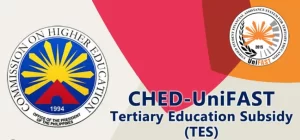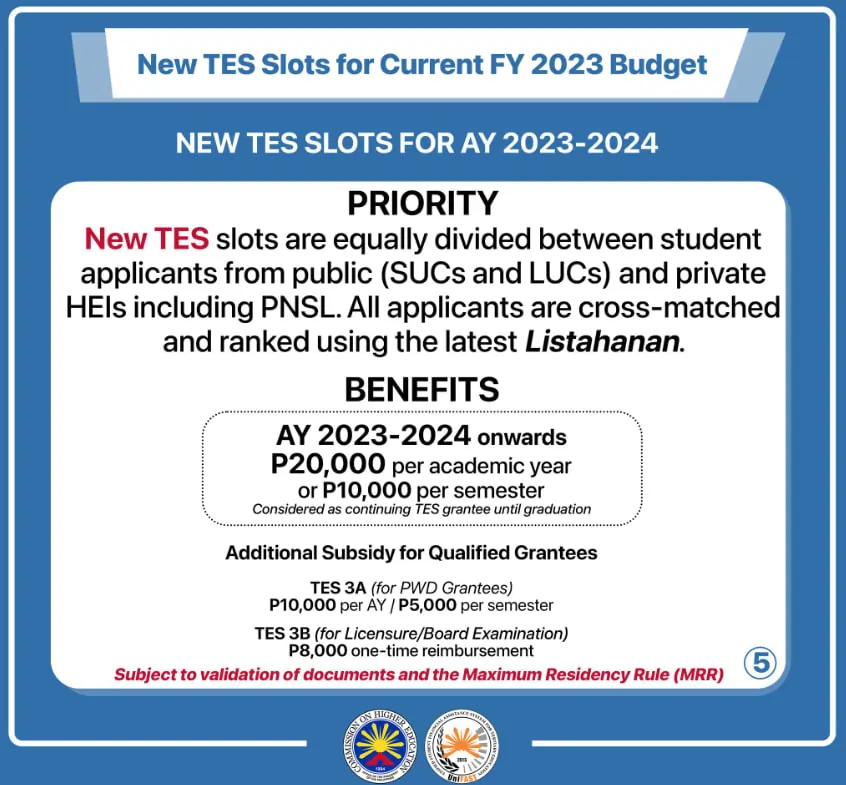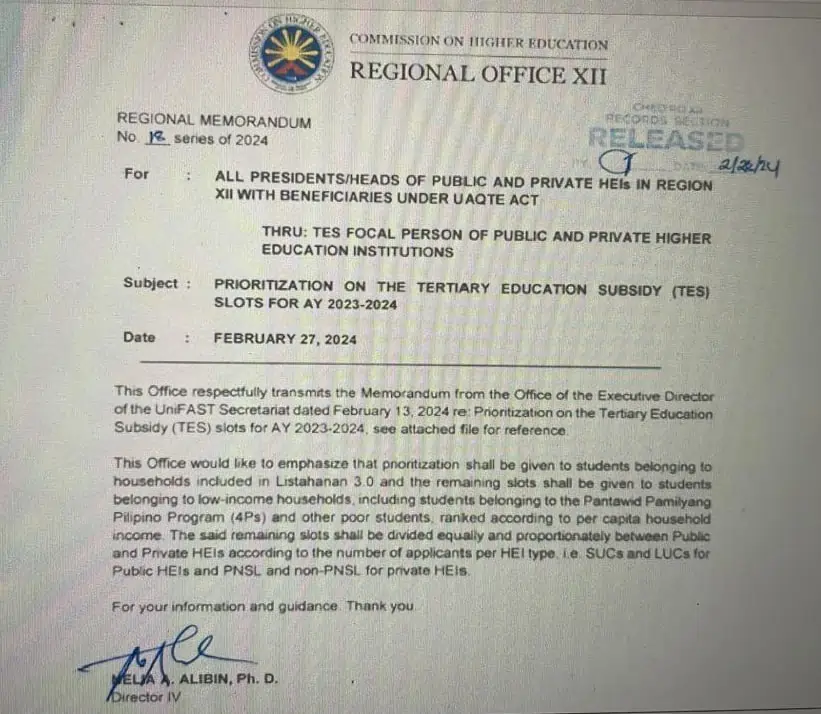UniFAST | MEMO for TES Grantees :Top 5 Big Impact to Students

The CHED-UniFAST Tertiary Education And Learning Subsidy (TES) update for the 2023-2024 is below currently. Tertiary Education And Learning Aid (TES) is a program that offers totally free higher education, totally free technological and trade education and learning.
Table of Contents
What is the CHED UniFAST Tertiary Education And Learning Aid– TES program
Tertiary Education Subsidy (TES) is a grant-in-aid program established by Republic Act 10931 to help professional pupils with limited economic means, as well as those living and studying in cities and districts without public universities or universities, with their education.
Through the Tertiary Education And Learning Aid (TES) program, the Compensation on Higher Education (CHED), in cooperation with the Unified Student Financial Aid System for Tertiary Education (UniFAST), provides educational opportunities for deserving Filipino pupils.
What is UniFAST– Unified Student Financial Support System for Tertiary Education And Learning
The establishment of the Unified Financial Help System for Tertiary Education And Learning Act, or UniFAST– also known as Republic Act No. 10687– on 15 October last year marked a significant milestone in the provision of financial aid for tertiary education. This act, also known as Republic Act No. 10687, was authorized into law on the same date in 2015.
UniFAST resolves, establishes, enhances, expands, and settles all government-funded modalities of Student Financial Assistance Programs (StuFAPs) for tertiary education– and particular purpose education assistance– in both public and private organizations into a solitary company.
Scholarships, grants-in-aid, trainee lendings, and other specialized sort of StuFAPs established by the UniFAST Board are among these techniques.
Tertiary Education Aid (TES) Slots 2023

UniFAST has revealed an upgrade to the CHED-UniFAST Tertiary Education And Learning Subsidy (TES) Slots for 2023 via Memorandum Round No. 05, collection of 2023.
This new plan will suit more and more financially challenged yet deserving students, considering the minimal budgetary appropriations for UAQTEA programs.
Memorandum Circular No. 5, collection of 2023
The Memorandum Round No. 5, series of 2023, mentions “To fit more financially-challenged and deserving pupils for the Tertiary Education and learning Aid and according to Board Resolutions No. 028 and 029 and consistent with the proposition of COCOPEA, the 50% or the Php 430,016,179.17 of the total Php 860,032,358.35 available Continuing FY 2022 UAQTEA funds is designated to open new Tertiary Education and learning Aid slots of Academic Year 2022-2023 for pupils in private colleges (leaving out PNSL)”.
TES Slots for FY 2023
Pupil Candidates in AY 2021-2022 Personal HEIs (excluding PNSL)– Listahanan
For the remaining proceeding budget plan of 2022, priority shall be given to trainee candidates submitted in the TES Online Portal throughout the University Year 2021-2022 secretive HEIS rated based on the most recent Listahanan.
Benefits
| AY 2022-2023 2nd semester | PHP 20,000 |
| AY 2023-2024 onwards | PHP 20,000 per academic year or PHP 10,000 per semester* |
| Additional Subsidy for Qualified Grantees: | |
| TES 3B (for Licensure/Board Examination) | PHP 8,000 one-time reimbursement |
What is the Universal Access to Quality Tertiary
Education Act or Republic Act No. 10931?
RA 10931 made it feasible for trainees to go after quality
tertiary education and learning without paying tuition and other school costs
in state universities and universities and CHED-recognized regional
universities and universities. Trainees can register for technical vocational education and learning and training programs in public training
organizations completely free.
It gives financial aid to students from the poorest of the
poor houses found in the most recent Listahanan 3.0 of DSWD
Does that implement RA 10931?
The Unified Pupil Financial Support System for
Tertiary Education, or UniFAST, is a connected company
of the Payment on College mandated to
execute RA 10931.
It was created in 2015 by RA 10687 as a system
to merge existing government student economic help
programs for tertiary education and learning in the Philippines.
UniFAST ensures that deserving Filipinos are given
equitable accessibility to educational chances
TERTIARY EDUCATION SUBSIDY (TES)
QUALIFICATION
Undergraduate students registered in SUCs, CHED-recognized LUCs and quality-assured exclusive College Institutions (HEIs), and programs in the CHED Registry
Subject to prioritization and schedule of funds including the Tulong Dunong Program (TDP).
ADVANTAGES
Grantees enrolled in SUCs, CHED-recognized. LUCs and exclusive HEIs are qualified to receive. PhP 20,000.00 per school year or PhP 10,000 per semester.
- Additional benefits for TES grantees. TES 3A – Persons with Handicap (PWD). PhP 10,000 per academic year or PhP 5,000 per semester. TES 3B – Board/Licensure Evaluation. maximum of PhP 8,000.00 one-time reimbursement.
CO-IMPLEMENTERS
- SUCs.
- CHED-recognized LUCs.
- Private HEIs in CHED Computer System Registry.
Prioritization
Time after time, TES ports undergo prioritization and even more. significantly, to schedule of funds. Top priority is offered to the candidates consisted of in the Listahanan 3.0 of the DSWD. Staying ports are for other bad and deserving pupils that are not part of the Listahanan 3.0, ranked according to estimated per capital home earnings, consisting of students coming from the Pantawid Pamilyang Pilipino. Program (4Ps). Submission of application does not ensure automatic incorporation right into. the program.
Regional Memorandum No.18 Series of 2024 : New Release
CHED RO XII UniFAST Regional Coordinators’ orientation on the updated processes of the UAQTE (R.A. 10931)
The UniFAST Secretariat performed an alignment with the UniFAST Regional Coordinators (RCs) of CHED Regional Workplace XII on the upgraded procedures for the Tertiary Education And Learning Aid (TES) and Tulong Dunong Program (TES) today, February 23.
Pioneered by UniFAST OIC—Executive Supervisor Atty. Ryan L. Estevez, the discussion forum “Review: UAQTEA Refine 2024 Version” highlighted the updated procedures and new provisions to boost performance in handling and executing the stated programs under R.A. 10931, or the Universal Access to Top Quality Tertiary Education And Learning Act (UAQTE).

Impact on Trainees Not Gotten Approved For the UniFAST Scholarship
The UniFAST scholarship, a program under the Republic Act 10931, intends to provide monetary support to Filipino pupils seeking tertiary education. While this effort offers significant benefits to eligible trainees, those who do not qualify for the UniFAST scholarship may face numerous difficulties and influences:
Financial Burden:
Trainees who need to be qualified for the UniFAST scholarship might experience an enhanced monetary problem. The scholarship assists with tuition charges, instructional expenses, and other associated expenses, which can relieve the economic strain on students and their households. With this assistance, students might be able to manage the costs connected with pursuing college.
Restricted Access to Resources:
The UniFAST scholarship offers monetary aid and open-source resources such as instructional materials, innovation, and expert advancement chances. Trainees who do not get the scholarship might miss out on these sources, which can impede their academic efficiency and overall instructional experience.
Minimized Opportunities:
Qualifying for the UniFAST scholarship can boost trainees’ access to quality education, learning, and future chances. Trainees who do not receive this assistance have restricted access to particular programs, internships, or networking opportunities that could increase their academic and expert growth. This restriction can affect their lasting occupation prospects and general success.
Psychological Effect:
The lack of ability to protect the UniFAST scholarship may also have psychological implications for pupils. The scholarship offers financial backing and also signifies acknowledgment of academic quality and potential. Students who do not certify may experience disappointment, insufficiency, or aggravation, affecting their inspiration and self-confidence.
Pressure on Households:
The financial strain of not receiving the UniFAST scholarship affects not only the students but also their families. Numerous households rely on scholarships and financial assistance to support their kids’ education. The lack of access to such support might develop additional pressure on family finances and resources.
Student coping mechanism with loss of UNIFAST eligibility
- Seek Guidance and Support: Reach out to school counselors, teachers, or academic advisors for guidance on alternative financial aid options or resources available to support your education.
- Explore Other Scholarships: Research and apply for other scholarships, grants, or financial assistance programs that you may be eligible for based on your academic performance, extracurricular activities, or personal circumstances.
- Consider Part-Time Work: If feasible, explore part-time job opportunities to help finance your education and cover expenses that were previously supported by the UniFAST Scholarship.
- Budgeting and Financial Planning: Develop a budget plan to manage your finances effectively, prioritize essential expenses, and make informed decisions about your educational expenses.
- Talk to Family and Friends: Open up to your family and friends about your situation to seek emotional support, advice, or potential assistance in navigating through this challenging time.
- Explore Student Loans: Consider options for student loans or financial aid programs that can help cover your educational costs while you work towards regaining eligibility for scholarships in the future.
- Focus on Academics: Stay focused on your studies and academic goals despite the setback, as maintaining good academic performance can open up opportunities for future scholarships or financial aid.
- Personal Well-Being: Take care of your mental and emotional well-being by engaging in self-care activities, seeking counseling if needed, and staying positive and resilient in the face of challenges.
- Seek Mentorship: Connect with mentors, alumni, or professionals in your field of interest who can provide guidance, support, and advice on navigating educational challenges and career opportunities.
Pros and Cons
The UniFAST (Unified Student Financial Assistance System for Tertiary Education) and TES (Tertiary Education Subsidy) programs in the Philippines have significant impacts on students pursuing higher education. Here are the top five impacts of these programs:
Pros:
1. Financial Support for Education:
- Impact: UniFAST and TES provide financial assistance to students who may otherwise struggle to afford tertiary education.
- Benefit: This support enables students to pursue their academic goals without being burdened by excessive financial constraints.
2. Increased Access to Higher Education:
- Impact: The programs widen access to tertiary education for economically disadvantaged students.
- Benefit: More students from underprivileged backgrounds can enroll in colleges and universities, thus promoting social mobility and reducing educational inequality.
3. Reduction of Dropout Rates:
- Impact: By alleviating financial pressures, UniFAST and TES help reduce dropout rates.
- Benefit: Students are more likely to complete their degree programs, leading to higher educational attainment levels and better career prospects.
4. Enhanced Academic Performance:
- Impact: With financial worries lessened, students can focus better on their studies.
- Benefit: This often results in improved academic performance and higher graduation rates among beneficiaries.
5. Skill Development and Employability:
- Impact: Access to higher education equips students with the skills and knowledge required in the job market.
- Benefit: Graduates are more competitive and better prepared for employment, contributing positively to the economy.
Cons:
1. Limited Coverage and Eligibility:
- Impact: Not all students who need financial assistance qualify for UniFAST or TES.
- Challenge: Some deserving students may still face financial barriers if they do not meet the strict eligibility criteria.
2. Bureaucratic Processes:
- Impact: The application and selection processes can be complex and time-consuming.
- Challenge: This may deter eligible students from applying or cause delays in receiving financial aid.
3. Dependency on Funding Allocation:
- Impact: The availability of funds for UniFAST and TES is subject to government budget allocations.
- Challenge: Insufficient funding may limit the number of students who can benefit from these programs in a given year.
4. Administrative Issues:
- Impact: Delays or errors in disbursement of funds can occur due to administrative challenges.
- Challenge: This can cause inconvenience and uncertainty for students relying on timely financial support.
5. Ongoing Program Evaluation and Adaptation:
- Impact: The effectiveness of UniFAST and TES may vary over time.
- Challenge: Regular evaluation and adjustments are needed to ensure the programs meet evolving needs and address shortcomings.
Despite these challenges, the overall impact of UniFAST and TES on students is positive, significantly improving access to higher education and fostering educational attainment among Filipino youth.
Positive Feedback from Students Who Availed the UNIFAST Scholarship:
- Gratitude and Appreciation:
- Feedback: “I am incredibly grateful for the UNIFAST scholarship. It has relieved my family of financial stress and enabled me to pursue my dream of higher education without worrying about tuition fees.”
- Opportunity for Academic Growth:
- Feedback: “The UNIFAST scholarship has provided me with the opportunity to focus on my studies and excel academically. I can now fully engage in my coursework and participate in extracurricular activities.”
- Improved Confidence and Motivation:
- Feedback: “Receiving the UNIFAST scholarship has boosted my confidence and motivation. It reaffirms that hard work pays off and encourages me to strive for academic excellence.”
- Access to Resources:
- Feedback: “Thanks to the UNIFAST scholarship, I have access to educational resources such as books, supplies, and technology, which are essential for my learning and success in college.”
- Sense of Belonging and Support:
- Feedback: “Being a UNIFAST scholar makes me feel valued and supported by the government and my community. It gives me a sense of belonging and drives me to contribute positively to society.”
Negative Feedback from Students Who Did Not Qualify for the UNIFAST Scholarship:
- Disappointment and Frustration:
- Feedback: “Not qualifying for the UNIFAST scholarship was disappointing and frustrating. I was counting on this support to pursue my education, and now I’m unsure how to manage the financial burden.”
- Financial Strain and Uncertainty:
- Feedback: “The lack of UNIFAST scholarship means increased financial strain on my family. It’s challenging to continue my studies without adequate financial support, and I’m uncertain about my future.”
- Impact on Academic Goals:
- Feedback: “Not being selected for the UNIFAST scholarship has impacted my academic goals. I may have to consider alternative options or delay my education due to financial constraints.”
- Feeling Overlooked or Undervalued:
- Feedback: “It’s disheartening to feel overlooked or undervalued when I know I could benefit greatly from the UNIFAST scholarship. I wish there were more opportunities available for students like me.”
- Desire for Fairness and Transparency:
- Feedback: “I hope for more transparency and fairness in the scholarship selection process. It’s important that deserving students receive the support they need to succeed in their academic endeavors.”
Frequently Asked Questions (FAQs)
What is the UniFAST MEMO for TES grantees?
The UniFAST MEMO outlines guidelines and benefits for Tertiary Education Subsidy (TES) grantees under CHED UniFAST.
How does the MEMO benefit TES grantees?
The MEMO enhances support for TES grantees by providing clearer opportunities and assistance for their educational needs.
What are the key impacts of the MEMO on students?
The MEMO ensures smoother processes for TES grantees, including timely disbursement of subsidies and access to additional educational resources.
How can students access the benefits outlined in the MEMO?
Students can access the benefits by following the guidelines set forth in the MEMO and coordinating with their respective educational institutions.
Where can I find more information about the UniFAST MEMO?
Additional details about the UniFAST MEMO can be obtained from CHED’s official website or through direct inquiries to CHED offices or authorized channels.
Conclusion
The CHED UniFAST memo detailing the Top 5 Impacts on students who are not qualified for the TES scholarship underscores the importance of alternative avenues and support systems for these individuals. While not receiving the TES scholarship, students can still benefit from increased awareness of available financial aid resources and other scholarship opportunities.
Additionally, the memo emphasizes the significance of fostering resilience and determination among students facing eligibility challenges, encouraging them to explore diverse pathways towards achieving their educational goals. Furthermore, the memo advocates for holistic support systems that prioritize academic guidance, mentorship, and career development to empower students beyond scholarship qualifications, promoting a culture of inclusivity and opportunity within higher education.
Advertisement


Nel Wiesenberg is a multifaceted individual known for his diverse career as a technical writer, author, and former professional poker player. His journey in the world of gambling began with a decade-long stint as a professional poker player before transitioning into technical writing. Wiesenberg’s contributions to the gambling community are extensive, having written for various publications over the years.
During his tenure as a professional poker player, Wiesenberg made a significant impact on the industry. He wrote for the original Gambling Times magazine, focusing on keno and poker, showcasing his expertise in these games. Additionally, he had regular columns in publications such as Poker Player and Pan Player +, a magazine catering to Panguingue players. Wiesenberg’s writing extended beyond gambling, with contributions to Dr. Dobb’s Journal, a computer magazine, and A+, a magazine for Apple computer users. His articles also appeared in publications like PC Publishing, Micro Times, Infoworld, and more.